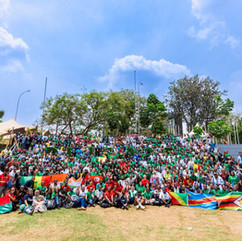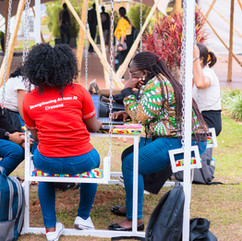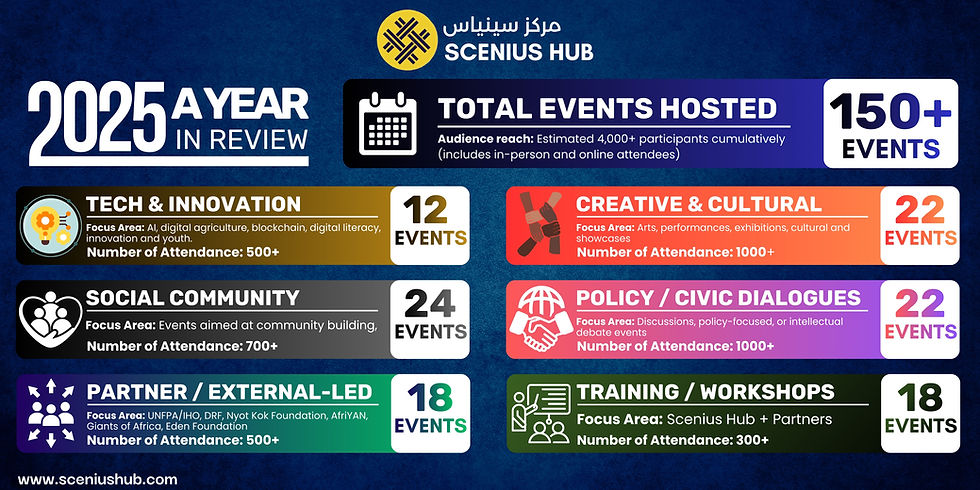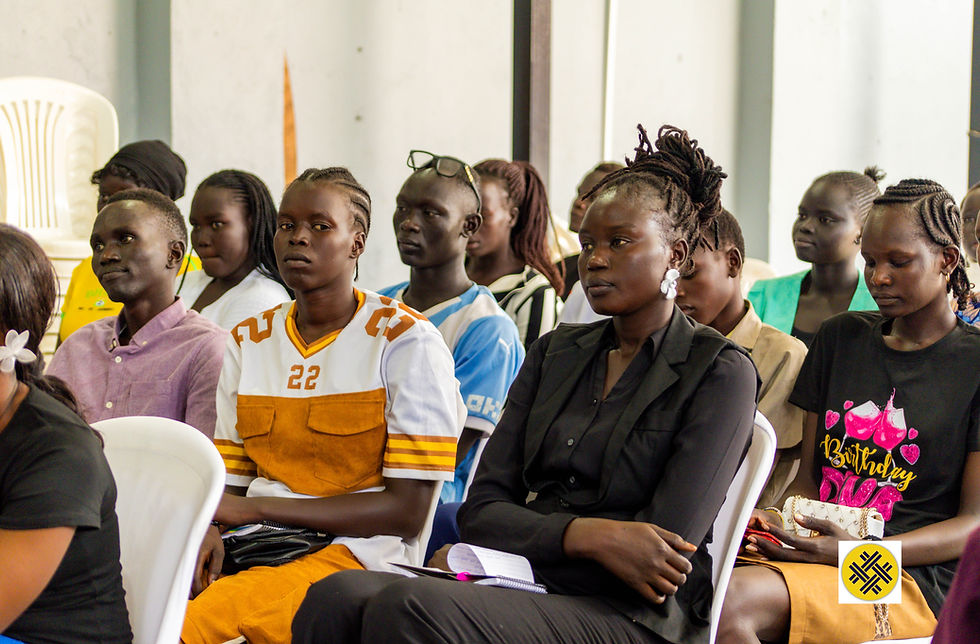South Sudan at Deep Learning Indaba 2025: Advancing Participation Through AI Research, Exhibitions, and Regional Integration
- Poni Henry
- Sep 9, 2025
- 6 min read
Kigali, Rwanda — August 2025
South Sudan participated in the Deep Learning Indaba (DLI) 2025 for the first time as an IndabaX chapter, taking place among 47 African countries in the continent’s largest AI gathering. The event brought together researchers, students, startups, and industry professionals for a week of immersive learning, community sharing, and regional collaboration focused on advancing Africa's leadership in Artificial Intelligence (AI) and Machine Learning (ML).

The country's presence was made possible with support from the Deep learning Indaba through Scenius Hub, a youth-led innovation space based in Juba that has been nurturing local talent through training programs, mentorship, and community events. By initiating IndabaX South Sudan earlier in the year, Scenius Hub positioned South Sudan for deeper regional integration and amplified the voices of local innovators working to solve pressing challenges using technology.

Keynote Addresses
The keynote sessions at Deep Learning Indaba 2025 provided thought-provoking insights into the direction of AI research and its societal implications. Verena Rieser of Google DeepMind opened with a session on aligning AI systems with diverse and sometimes conflicting human values, raising important questions about AI safety and ethics. Max Welling, professor and CTO of CuspAI, presented on the transformative role of AI in scientific discovery, particularly in materials science and drug development. Sanmi Koyejo from Stanford discussed the need to move beyond static benchmarks and toward scientifically grounded methods for evaluating AI performance and safety. Dina Machuve closed the keynote series with a compelling talk on using deep learning models to detect poultry diseases in Tanzania, demonstrating how AI can directly improve agricultural productivity and rural livelihoods. Together, these sessions highlighted the need for context-sensitive, ethically grounded, and interdisciplinary approaches to AI development in Africa and beyond.
Structured Learning Through Tutorials and Practicals
The Indaba offered a robust academic track through tutorials and practicals, which combined theoretical understanding with applied learning.
Deep Generative Models
The session led by Exaucé Luweh Adjim Ngarti explored the foundation of generative models tools that learn patterns from data to generate new content. Participants were introduced to probability distributions, latent space, and model families like GANs, VAEs, and diffusion models. These tools are behind many AI-driven content platforms, from media generation to scientific simulations. The instructor balanced accessibility with mathematical rigor, making the session suitable for both beginners and advanced learners.
The corresponding practical session allowed participants to manipulate real datasets, generate images using pre-trained models, and reflect on the ethical risks of synthetic media. This hands-on experience contextualised theoretical knowledge within real-world applications, such as AI art, face generation, and deepfake detection.
Large Language Models and Attention
In the tutorial by Luis Serrano, attendees learned how transformer models like GPT, BERT, and LLaMA work. Concepts like tokenization, embeddings, and the attention mechanism were broken down into digestible steps. The session used relatable examples to explain how attention helps models understand word relationships and sequence meaning, enabling functions like summarisation, translation, and dialogue.
The practical session built on this by guiding participants through the training of small-scale language models, comparing tokenizers across languages, and understanding how model architecture affects inference speed and cost. This was particularly eye-opening for attendees from countries with low-resource languages, including South Sudan, as it introduced pathways for developing language technologies adapted to local needs.
Reinforcement Learning
Arnu Pretorius’s tutorial on reinforcement learning (RL) provided foundational knowledge of how agents interact with environments to learn optimal actions via rewards. Participants explored policy gradients, which underpin many real-world systems such as autonomous navigation and recommendation engines. This was followed by a practical where attendees trained a simple agent to play Snake using the REINFORCE algorithm, learning about policy design and performance evaluation.
Quantum Computing and the Future

Yousra Farhani introduced the core principles of quantum computing, including qubits, entanglement, and quantum parallelism. The tutorial addressed the challenges of algorithm development, hardware constraints, and hybrid quantum-classical models, offering a glimpse into future computation tools that could transform fields like cryptography, chemistry, and AI itself.
Workshops on African Solutions
A key strength of Indaba 2025 was the variety of workshops that engaged participants in practical problem-solving and community-driven research. South Sudan’s delegation attended and contributed to many of these workshops, gaining insights into how African AI communities are building resilient, ethical, and scalable solutions.
Full-Day Workshops
Robotics and Automation in Africa: Explored how automation can be applied in agriculture, healthcare, manufacturing, and energy. The workshop emphasized open hardware systems and building robotics education in resource-constrained settings.
Trustworthy AI (TrustAI): Focused on public engagement, ethical alignment, and designing AI that reflects African values. Discussions included how to build trust in AI systems and protect communities from algorithmic harm.
AI for Business and Finance in Africa: Connected researchers and industry leaders to explore how AI can serve African enterprises. Covered topics such as credit scoring, customer service automation, and financial inclusion.
AI for a Climate-Resilient Africa: Addressed the role of machine learning in environmental monitoring, disaster prediction, and adaptation. Participants shared use cases like AI-based flood modelling and agricultural forecasting.
Centring Data in African AI: Explored issues around data governance, dataset scarcity, representational bias, and community-owned datasets. This session aligned with South Sudan’s goal of developing locally relevant datasets.
Data Science for Health in Africa: Investigated how AI and data tools are improving diagnostics, prevention, and medical service delivery. Topics ranged from medical image analysis to disease prediction models tailored for African healthcare settings.
Half-Day Workshops
Human-AI Interaction in the Global Majority: Focused on interface design and AI use in informal and underserved contexts. Highlighted human-in-the-loop systems for civic tech, education, and local governance.
Quantum Machine Learning for Africa (QML4Africa): Introduced Qiskit and explored the use of quantum models in cancer diagnosis through histopathology image classification.
Responsible AI: From Africa to the World: Encouraged a research-first approach to ethics and justice in AI, discussing how grassroots African work can influence global AI standards.
NeuroAI Workshop: Connected neuroscience and AI. Participants examined biologically inspired algorithms and their implications for neural interface development and computational cognition.
Voices of Africa Vol. 2: Advancing African NLP: Examined progress and challenges in developing natural language processing (NLP) tools for African languages. Discussions included dataset creation, multilingual benchmarks, and ethical considerations in language AI.
The Compute Workshop: Explored advanced computing methods including high-performance computing (HPC), green computing, and neuromorphic designs. Provided strategies for applying these systems in low-resource environments.
Exhibitions and South Sudan’s Showcase
The Indaba exhibition space provided a platform for countries, startups, and communities to showcase their work, connect with collaborators, and tell their stories.
South Sudan’s exhibition, organised by Scenius Hub, featured three key components:
Country Representation: Many attendees visited the booth to learn more about South Sudan’s journey, challenges, and aspirations in digital transformation and education.
IndabaX South Sudan: Materials and visual displays showcased the launch of IndabaX South Sudan 2025, highlighting its community outreach, and plans to grow AI education across states.
Emerging Research and Startups: The exhibition also presented concept notes and early-stage work on AI for education, agriculture, and language technology, developed by youth and volunteers participating in Scenius Hub’s local programs.
Poster Sessions and African AI Research
South Sudan also engaged in poster sessions, where researchers from across Africa presented their work in:
Natural Language Processing (NLP) for African languages
Energy notifications using LLMs
AI-powered agricultural diagnostics
Wildlife image classification
Amharic climate discourse analysis
These projects demonstrated both the technical maturity and regional relevance of African AI work. The session fostered mentorship, peer review, and sparked collaboration ideas such as adapting object detection models for local disease surveillance or exploring sentiment analysis in South Sudanese languages.
Vision for the Future: Opening Doors for Youth
Participation in Indaba 2025 reinforced the need to expand AI access beyond major cities and across borders. Scenius Hub, through its growing partnerships, now seeks to:
Support youth-led AI startups
Develop context-specific datasets for South Sudan
Launch AI research fellowships and mentorships
Host community events on robotics, AI ethics, and data collection
Collaborate with universities and institutions to integrate AI into the curriculum
These steps are critical to opening this experience to more young people and equipping them with tools to build solutions for South Sudan’s local challenges.
Conclusion
South Sudan’s participation in Deep Learning Indaba 2025 demonstrated both readiness and potential. Through structured learning, collaborative spaces, and visible engagement, the country took its first step into Africa’s broader AI conversation.
As one of the newest IndabaX communities, South Sudan has shown that with support, curiosity, and initiative, even countries with limited AI infrastructure can play a meaningful role in shaping Africa’s digital future.












































































Comments